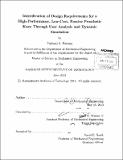Identification of design requirements for a high-performance, low-cost, passive prosthetic knee through user analysis and dynamic simulation
Author(s)
Narang, Yashraj S. (Yashraj Shyam)
DownloadFull printable version (11.21Mb)
Other Contributors
Massachusetts Institute of Technology. Department of Mechanical Engineering.
Advisor
Amos G. Winter, V.
Terms of use
Metadata
Show full item recordAbstract
In January 2012, a partnership was initiated between the Massachusetts Institute of Technology and Bhagwan Mahaveer Viklang Sahayata Samiti (BMVSS, a.k.a., Jaipur Foot) to design a high-performance, low-cost, passive prosthetic knee for transfemoral amputees in India. The knee was primarily intended to improve the walking gait of amputees relative to existing low-cost devices. This thesis aimed to identify detailed design requirements for the prosthetic knee through user analysis and dynamic simulation. User analysis identified the needs and constraints of numerous stakeholders in the prosthesis development process. Members of the Indian biomechanics, prosthetics, and rehabilitation communities were interviewed to identify general requirements for the design, manufacturing, evaluation, and fitting of a prosthetic knee, and a structured survey of Indian amputees was conducted to quantify the demographics, functional capabilities, and functional needs of future end users. Dynamic simulation identified methods to enable transfemoral amputees to walk with reduced energy expenditure and normative gait kinematics. 2-dimensional inverse dynamics simulations were used to calculate the effects of inertial alterations of a prosthetic leg on the energy expenditure required to walk with normative kinematics. In addition, simulations were performed to compute the effects of inertial alterations on the knee moment required to walk with normative kinematics. Mechanical power analysis, sensitivity analysis, and optimization were used to formulate a passive mechanical model that could accurately reproduce the specified knee moment. The effects of walking cadence on critical results were also examined. Through the identification of user-centered and biomechanical requirements, the thesis provides a blueprint for the mechanism design comprising the next phase of the project.
Description
Thesis (S.M.)--Massachusetts Institute of Technology, Dept. of Mechanical Engineering, 2013. Cataloged from PDF version of thesis. Includes bibliographical references.
Date issued
2013Department
Massachusetts Institute of Technology. Department of Mechanical EngineeringPublisher
Massachusetts Institute of Technology
Keywords
Mechanical Engineering.